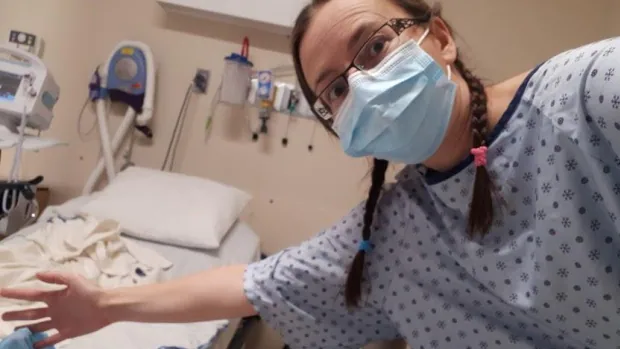The reality is, one of the hardest parts of cancer diagnosis in the pandemic is going through so much of this alone, writes cancer patient Ann Cavlovic.

This First Person article is the experience of Ann Cavlovic, a writer based in western Quebec. For more information about CBC’s First Person stories, please see the FAQ.
A cancer diagnosis is brutal at the best of times, let alone at the start of a pandemic. Yet people still seem surprised by how the timing of my diagnosis affected my treatment.
Surely, they think, a life-threatening tumour would push me to the front of the line.
The reality is that we’re still digging out of a backlog of elective surgeries that were cancelled before we understood how this virus worked. That term “elective” is deceptive; cancer surgery is not “elective” like a class in school. It just means you likely won’t die if surgery happens on Thursday instead of Tuesday unlike a burst appendix.
For the type of breast cancer I had, it’s normal to start with a mastectomy. Then, based on test results, determine whether chemotherapy or hormone treatments are needed. But I was scheduled to first start chemotherapy to remove one name from the operating room’s waiting list.
I protested, saying there’s a decent chance I might not need chemotherapy, which is powerful but causes all kinds of other damage to the body.
After a lot of stressful phone calls — and I believe a herculean effort by my surgeon — I did get a spot for my surgery. But I had to wait three months — the maximum that’s considered an acceptable risk. Every day during that wait, whenever I felt a twinge or ache, I worried that was the moment the cancer was spreading to my bones or organs. At that point, the cancer is no longer curable.

In the end, I only received hormone therapy and avoided an unnecessary, brutally harsh treatment. And I’m far from the only one who’s had to face suboptimal or disrupted treatments in this pandemic.
Even when things were going according to plan, there were delays getting tests and appointments. But far scarier were the times when I’d finally show up outside the hospital, only to find someone in the lineup irate about putting on a mask. Dodging their cloud of vitriol felt like a deadly combat mission. Cancer, and its treatments, make you more vulnerable to COVID.
The loneliness of it all
The reality is, one of the hardest parts of cancer diagnosis in the pandemic, is going through so much of this alone.
My family doctor delivered the diagnosis over the phone. Whenever I received bad news at the hospital, I walked to my car without holding anyone’s hand. The day of my surgery in July 2020, I lay on a gurney, my chest marked up with Sharpie where the incisions would be to remove my breasts, and waited for hours staring at the chair no one was allowed to sit in.
A comforting presence at such times is not trivial. It can make the difference between whether or not your brain processes an event as traumatic. Depression is common after cancer treatment. My mental health hit the floor.
My friends were wonderful and sent over meal delivery kits for months. But in that year before we were vaccinated, they couldn’t come over for a hug. They were also drained from the pandemic.
Caregivers, too, are affected. My partner, as my main caregiver, needed to vent his understandably complicated feelings. Although I was the last person he should do that with at certain times, his options to see friends or family were limited.

Yet there have been some pleasantly surprising signs of resiliency in our systems. Thanks to the first fully online breast cancer support group in my city, I made meaningful friendships with other women. We’ve shared our deepest fears and intimacies over Zoom, and finally met in person in my backyard this past summer. I even made a new best friend, or “breastie.” Yet, because she is more immunocompromised, we have never once hugged.
Recently, I had a mammogram to see whether the cancer has recurred. The technician shoved my reconstructed body into the machine with a brusqueness I couldn’t fault her for, as she seemed so clearly on the edge of burning out herself.
I walked into the hospital for this mammogram three months later than the normal testing schedule. But now, this wait is so long partly because remaining hospital staff are overburdened with COVID protocols and patients who, at this point, are largely unvaccinated.
While waiting my turn in a blue gown, I stared down the corridor at other patients spaced two metres apart. The vaccine hesitant don’t see this, I thought to myself. What would happen if they could see inside a hospital now? If they knew how every COVID hospitalization has ripple effects on people with cancer and other diseases. Would it tip the scales, for some at least?
As I write this, my wait for results from that mammogram has reached the six-week mark. I’m grateful for the health-care professionals who are working so very hard. And I’m hoping for the best.
CBC Quebec welcomes your pitches for First Person essays. Please email [email protected] for details.

